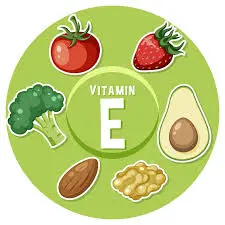Worried about diabetic retinopathy?
Trust Sai Jyothi Eye Hospital, Hyderabad’s top choice for expert diabetic eye care.
Book your check-up today.
The Role of Vitamins in Diabetic Retinopathy
Imagine looking through a fogged-up window. For some individuals with diabetes, this is how the world begins to appear when diabetic retinopathy sets in.
But did you know that certain vitamins might help protect and support vision for people battling diabetes?
This article dives into the connection between vitamins and diabetic retinopathy in an easy-to-understand way, showing how small changes can create a big impact on eye health.
What This Article Will Cover:
- What diabetic retinopathy is and how diabetes affects your eyes.
- How vitamins like A, B, C, D, and E support eye health.
- Practical ways to include these vitamins in your daily life.
- When it’s time to consult a doctor about your eyes.
Now, let’s take it step by step.

AUTHOR
Ophthalmologist/ Eye Surgeon 13+ Years Exp
MBBS, MS – Ophthalmology
CONDITION
CALL US 24/7 FOR ANY HELP
GET IN TOUCH ON
What Is Diabetic Retinopathy?
To understand diabetic retinopathy, think about the smallest, most delicate blood vessels in your body. Did you know your eyes are packed with tiny blood vessels that help your retina (the light-sensitive layer at the back of your eye) do its job?
For people with diabetes, high blood sugar can damage these blood vessels over time. This condition is called diabetic retinopathy.
Diabetic retinopathy can cause vision problems, bleeding in the retina, swelling, and even blindness if left untreated. People with long-standing diabetes or poorly controlled blood sugar are at a higher risk. But here’s the silver lining—we can take steps to lower this risk, and this is where vitamins play a crucial role.
How Diabetes Affects the Eyes?
Diabetes damages the eyes in several ways:
- Weakened Blood Vessels: The blood vessels in the retina become leaky, leading to fluid build-up.
- Poor Circulation: High sugar levels can block blood flow in these small vessels, starving the retina of oxygen.
- New but Fragile Vessels: To compensate, the body develops new blood vessels, but these are fragile and prone to bleeding.
- Swelling in the Macula: The area responsible for sharp vision swells, often called diabetic macular edema.
Symptoms might include blurry vision, difficulty seeing at night, or dark spots in your sight. Addressing these issues early can prevent complications.
Now, let’s see how vitamins can help support eye health.
The Role of Vitamins in Preventing or Managing Diabetic Retinopathy
1. Vitamin A
Vitamin A is like a shield for your eyes. It protects the retina and helps with night vision. One of its most significant roles is maintaining the surface of the eye and reducing oxidative stress (a form of damage that happens when harmful molecules accumulate in your body).
Studies Show:
People with diabetes often have lower levels of Vitamin A. Including it in your diet might lower your overall risk of developing retinopathy.
Where to Find It:
- Carrots
- Sweet potatoes
- Spinach
- Liver
2. Vitamin B Complex
The B vitamins are a family with specific benefits for people with diabetes and retinopathy:
- Vitamin B1 (Thiamine): Helps with blood sugar regulation and prevents nerve damage.
- Vitamin B6, B9 (Folic Acid), and B12: Lower levels of a harmful substance called homocysteine, which contributes to blood vessel damage in the retina.
Real Example:
A small study found that a group of patients took B6, B9, and B12 tablets for six months. They had improved eye function and reduced swelling compared to others.
Food Sources:
- Eggs
- Whole grains
- Leafy greens (like spinach)
- Chicken and fish
3. Vitamin C
Vitamin C is a powerful antioxidant. It’s like a repair worker for the damage caused by high blood sugar. It strengthens the blood vessels in the eyes and supports overall eye health.
Research Highlight:
Higher dietary intake of Vitamin C (through fruits and vegetables) has been shown to lower the risk of diabetic retinopathy by up to 50%.
Vitamin C-Rich Foods:
- Oranges
- Kiwi
- Bell peppers
- Strawberries
4. Vitamin D

Often called the “sunshine vitamin,” Vitamin D’s impact extends beyond bone health. It has anti-inflammatory benefits that protect the eyes from swelling and damage. Interestingly, people with Vitamin D deficiency are more likely to develop retinopathy.
Take Note:
One study found that patients with adequate Vitamin D had a 30% reduced risk of diabetic retinopathy.
Get Your Dose:
- Sunlight (15–20 minutes a day)
- Fortified milk or cereals
- Fatty fish like salmon
- Supplements (only with a doctor’s advice)
5. Vitamin E

Vitamin E is another antioxidant that protects the eyes by reducing oxidative stress. It keeps your blood vessels healthy and might delay the progression of diabetic retinopathy.
Did You Know?
A clinical trial showed that patients with diabetic retinopathy had better eye function when their Vitamin E levels were improved.
Sources of Vitamin E:
- Almonds
- Sunflower seeds
- Avocado
- Olive oil
Practical Tips for Incorporating Vitamins Into Daily Life
- Add More Colors to Your Plate: Include a variety of leafy greens, citrus fruits, nuts, and whole grains.
- Choose Whole Foods Over Supplements: While supplements are helpful, your body absorbs vitamins better when they come from food.
- Don’t Skip the Sunshine: A few minutes in the sun (safely, without sunscreen) can help your body produce its Vitamin D.
- Snack on Nuts and Seeds: A handful of almonds or sunflower seeds can boost your Vitamin E levels.
- Cook Smart: Overcooking vegetables can destroy their vitamins, so opt for steaming over boiling.
⇒A One-Day Meal Plan for Better Eye Health:
1.Breakfast: Spinach omelette with a glass of fortified milk (Vitamin D and B)
2.Lunch: Grilled salmon with a side of kale and orange slices (Vitamin C, D, and A)
3.Snack: Raw carrots with hummus (Vitamin A)
4.Dinner: Whole grain rice with stir-fried bell peppers and almonds (Vitamin E and B)
When to Consult a Doctor
While vitamins are essential, they’re not a replacement for medical care. Contact your doctor or an eye specialist if you experience:
- Blurry vision or dark spots.
- Difficulty reading or seeing at night.
- Sudden vision changes or pain in the eyes.
Your eye doctor might recommend an eye exam, bloodwork, or even supplementation if there’s a deficiency.
Final Thoughts
Diabetic retinopathy is a preventable condition when you make informed decisions about your health. Vitamins like A, B, C, D, and E act as your allies in protecting your vision and lowering your risks.
By eating well, staying active, keeping blood sugar in control, and consulting your doctor regularly, you can safeguard your eyes while living with diabetes. Remember, every small step adds up to better vision and overall health. Choose your health today. Your future self will thank you!
Appointment Form
AUTHOR
Ophthalmologist/ Eye Surgeon 13+ Years Exp
MBBS, MS – Ophthalmology
CONDITION
CALL US 24/7 FOR ANY HELP
GET IN TOUCH ON
Appointment Form
About Us
Saijyothi Eye Hospital, where excellence meets compassion. Founded by the esteemed Dr. Saibaba Goud, M.S., Ph.D., Padma Shri Awardee, our institution stands as a beacon of hope for those seeking exceptional eye care. Dr. Saibaba Goud’s vision goes beyond restoring sight, aiming to transform lives. At Saijyothi Eye Hospital, we offer exceptional care, from routine eye exams to advanced surgeries, with personalized services tailored to each patient’s needs.
Our Locations:
West Marredpally
- Plot No 185, Road No 1 Beside Kennedy School, Opposite lane to Om Shanthi Foods, West Marredpally, Secunderabad-500026.
Kompally
- 3rd Floor, Vaishnavi Lemini Arcade, Doolapally Road, Above Ratnadeep Super Market, Devender Colony, Kompally, Hyderabad, Telangana 500014
Uppal
- D.No. 2-2-15, Hanuma Sai Nagar, Uppal X Roads, Near Gandhi Statue Centre, Uppal, Hyderabad, Telangana 500039
© Copyright Saijyothi Eye Hospital 2025





